When the COVID-19 pandemic hit, our infection prevention nurses became everyone’s go-to persons for guidance to stay safe, and for support to deal with their anxiety.
Steady hands in uncharted waters
“Since the start of the pandemic in January, the infection prevention nurses have been rostered to be on-call round the clock. For the first three months, I would get calls until 3 or 4 o’clock in the morning. Doctors or nurses could be asking: “How do we transfer a suspect case to the isolation ward?”, or “How do we handle the body of a deceased COVID-19 patient?” Everyone was unsure – there was no textbook or existing protocol to refer to,” said Senior Nurse Clinician Molly How. “So we walked them through the process step-by-step, applying the best practices in infection prevention that we are trained in,” said Molly who has been an infection prevention nurse for 19 years.
Sharing a similar experience early in the outbreak, Senior Staff Nurse Kamini Devi d/o Magesparan recalled, “I was back in SGH one Sunday as a COVID-19 patient needed an urgent CT-Scan. I saw to the entire process - watching over our staff to make sure they are safe, that they wear the proper PPE and correctly, and that there was no contamination during the transportation from the isolation ward to the Department of Diagnostic Radiology."
Added SNC Molly, “We also go down to the clinics and centres to walk through their patient flow, in order to design processes that minimise risk of transmission.”
“But it is challenging to deal with workflow that I have never encountered before,” said Senior Nurse Clinician Tan Kwee Yuen, who has been an infection prevention nurse for 17 years. “I have to understand the procedure that the patient is going for, check out the procedure facility so that I know what precautions to take, for example, which equipment to cover to reduce the amount of cleaning afterwards. I may also need to consult others, such as Biomedical Engineering colleagues who would advise on the number of filters I would need if I was using a ventilator during the transfer of the patient.”
Infection Prevention and Epidemiology (IPE) is also mobilised once a staff comes down with COVID-19. “Our Epidemiology colleagues will handle contact tracing. The Infection Prevention team will go on site to assess the staff’s work area - did he sit with others, did he go to the pantry, what surfaces might he have had contact with. Then we will work out how much to clean, what cleaning solution to use – all worked out step-by-step with the Environmental Services team to ensure that the environment is cleaned properly and safe for staff to use the next day,” explained SNC Molly.
Calming nerves
Probably stricken by fear and stress, some staff lashed out at the IPE colleagues who were also facing an unprecedented situation. “At the onset of the pandemic, for three weeks we did nothing but N95 mask fitting, for about 250 staff every day from 9am to 5pm. The stream of staff was never ending, as everyone needed to have the correct mask in order to stay safe, but the fitting process cannot be rushed. Some were impatient, and lashed out at us for being ‘so slow’, causing one of my colleagues to break down and cry. The situation improved after management turned up to speak to the staff waiting for fitting,” recounted Asst Nurse Clinician Bushra Binte Shaik Ismail.
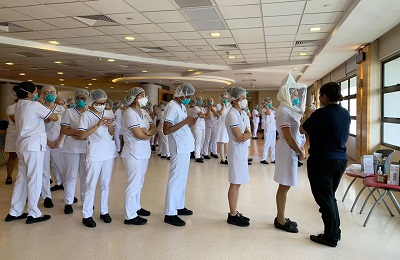
Healthcare workers have to be N95 mask-fitted to ensure the model and size of the N95 fits their face shape. A good fit is required for a good seal to protect against viruses.
IPE also conducts refresher training, taking staff through the steps of donning and doffing of Personal Protective Equipment (PPE) so that they remember to observe the sequence of first-in-last-out to prevent contamination, and teaches them to clean the equipment after each patient use to avoid spreading the virus.
After the training, they received many queries from staff who were afraid or worried. “Some would call us after our refresher training sessions on the use of PPE. They were afraid but dared not say so when they are in a group, or tell their supervisors. So we came up with a daily e-newsletter to answer these burning questions, to provide them with facts and information for better psychological support. We reached out to our existing network of Infection Prevention Liaison Officers (IPLOs) to disseminate the e-newsletter to their own clinical areas during their daily rollcall,” said ANC Bushra.
Keeping everyone safe, everywhere
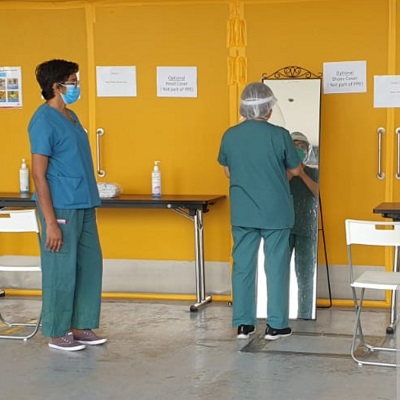
An infection prevention nurse watching over a staff at CCF, EXPO to ensure she dons her PPE correctly so she is protected against the virus.
After taking unfamiliar workflows at SGH in their stride, IPE colleagues soon found themselves figuring out how best to keep everyone safe in unfamiliar locations such as Migrant Workers Dormitories, Community Care Facilities (CCF) and Recovery CCF such as the EXPO and D’Resort, respectively. For every new offsite deployment, the IPE team is there. They also extended their training and watchful eyes to the non-healthcare partners who run these facilities.
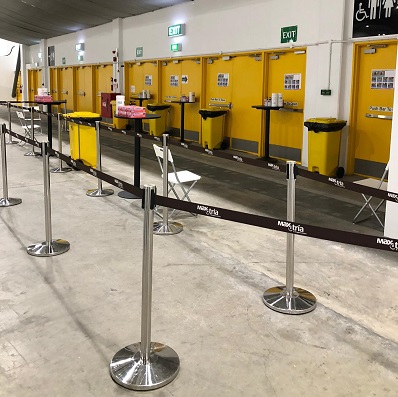
PPE de-gowning section at CCF, Expo
“At our Community Care Facility at the EXPO Halls 7 to 10, we set up the PPE gowning and de-gowning station so that there are separate in-flow and out-flow to prevent cross contamination,” said SNC Kwee Yuen. She helps Assistant Director, Nursing Lee Lai Chee to lead a team of 10 nurses from SGH Campus to train and audit our medical team, as well as non-medical staff from Resorts World Sentosa (RWS) managing the CCF at EXPO and staff from Village Hotel Sentosa and Concorde Hotel who are running the operations of Swab Isolation Facility (SIF) at respective hotels.
“We train the RWS cleaners how to clean surfaces to get rid of the virus to prevent transmission, to clean the cubicle after a patient has been discharged, and to segregate clean and dirty items.
“A SATA van comes to do x-rays. We teach their radiographers the basic principles of infection prevention and control such as how to clean their equipment, how to protect themselves when they are handling a patient, proper donning and doffing of PPE, and the seven steps of hand hygiene,” said SNC Kwee Yuen.
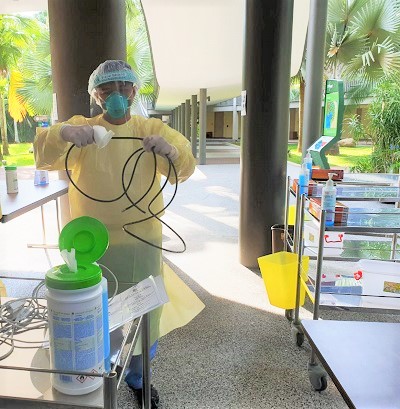
COVID-19 can be transmitted through contact with contaminated surfaces. Here, a staff disinfects equipment at the Recovery CCF, D’Resort to prevent transmission of the virus.
While SNC Kwee Yuen was busy at the CCF at EXPO and Recovery CCF D’Resort, ANC Bushra and SSN Kamini were hard at work training and auditing our staff deployed to the Migrant Worker Dormitories and Swab Isolation Facilities (SIFs).
“Since end April, I have been training our Campus staff deployed to the mobile medical teams, mobile swab teams and mobile phlebotomy teams at the dormitories and the SIF at Village Sentosa and Concorde Hotel. Besides enrolling them in e-learning modules, I conduct daily sessions on the correct donning and doffing of PPE. I also went to Village Hotel Sentosa and Concorde Hotel to mask-fit and train their housekeeping, security and front desk staff on hand hygiene, PPE and basic infection prevention practices. For our mobile phlebotomy teams, our training includes how to manage sharps injury,” said ANC Bushra, who leads a lean team of three to conduct these training.
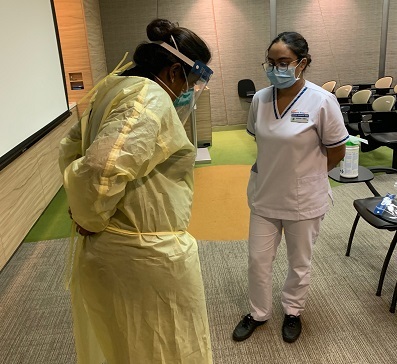
ANC Bushra (right) giving a PPE donning practical to a staff deployed to the dorms
SSN Kamini co-leads a team of four Campus infection prevention nurses to audit our staff who volunteer at the various dormitories managed by SGH. “Audit is important, because it enables us to see whether our staff are doing what we taught them correctly. If they are not compliant, they risk getting infected. My colleague Ismail and I visit different dormitories every day to watch over our staff to ensure they do appropriate hand hygiene, don and doff PPE and gloves correctly, and wipe down equipment after use by each patient,” she explained.
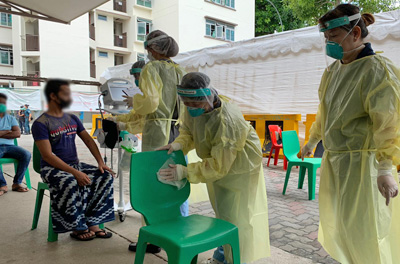
At the dormitories, an infection prevention nurse watches over as a staff wipes down the chair after each patient use to prevent transmission. The COVID-19 virus can stay on plastic surfaces for 2 to 3 days.
“At the dormitories, when we first conducted our audits, some staff were not so welcoming. They felt we were there to police them, or to catch them making a mistake. Hence, they just ignored us. So before starting the audit, I’d introduce ourselves to the staff and explain that we were there not to find fault but to protect them from getting infected. Now, whenever I visit the dormitories, staff are eager to ask me if they are doing things correctly. Now they understand that we are here to keep them safe,” said SSN Kamini.
Holding up amidst a protracted pandemic
“Some days I’d feel that I can’t do this anymore. Then I’d just go home and sleep it off. What keeps me going is knowing that my training does make a difference. Especially when colleagues come up to me to say, ‘Thank you. I appreciate the explanation. I was very worried. But now I am assured.’,” shared ANC Bushra.
As for SARS veteran SNC Molly, she manages her own expectation. “Mentally, I’m prepared. From my experience with SARS, I know that this will not blow over anytime soon. So, I tell myself, ‘It will take time, and I will have to work with the new normal.’ Then it is easy to get through each day.”
Taking joy in the simple things
Working under such pressure-cooker conditions, our infection prevention nurses find ways to relieve stress.
Shared SNC Kwee Yuen, “I take joy in the little things that I tend to overlook during peace time. As I’m walking to the bus stop, I will just pause to appreciate the flowers and the butterflies. That makes me happy. It’s also lovely to go home to my dog, who’d always greet me at the door.”
As for ANC Bushra, nothing beats some TLC. “Every day, I’d pamper myself with a facial mask. It makes me feel very relaxed.”
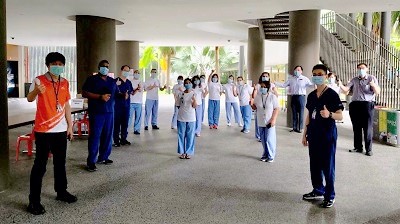
Our IPE team with the medical team and staff volunteers at Recovery CCF, D’Resort
At the end of the day, our infection prevention nurses managed to survive it all because they work as a team. Taking the opportunity to appreciate her team, SNC Kwee Yuen said, “Big thanks! I appreciate you working very hard day and night, sometimes sacrificing time with your little ones. Without you, this journey would not be sustainable. Because it is like a marathon with no end in sight.”
We love mail! Drop us a note at lighternotes@sgh.com.sg to tell us what you like or didn’t like about this story, and what you would like to see more of in LighterNotes.
